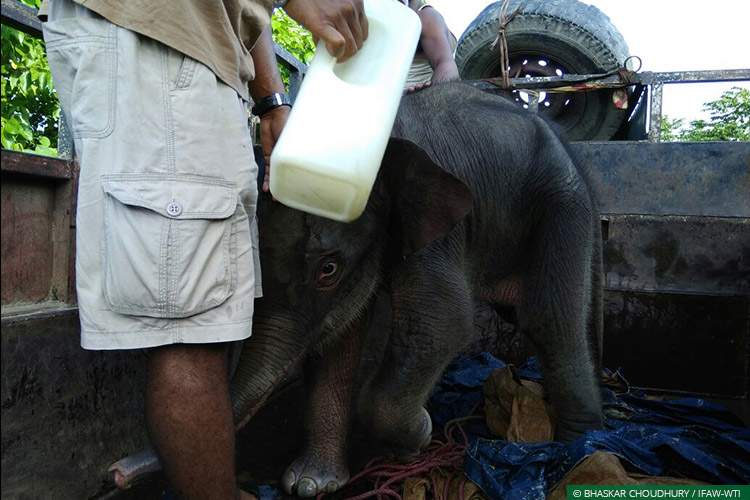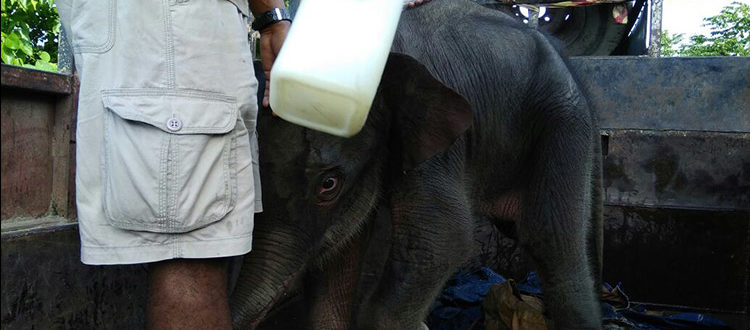IFAW-WTI MVS Team, Forest Department Help Elephant Calf Reunite with Wild Elephant Herd in Baksa Forest Division

Baksa Forest Division, Bodoland Territorial Area District (BTAD), July 6, 2017: A displaced female elephant calf, between two and three months old, was rescued yesterday by villagers near the Barnadi, a river on the fringes of the Barnadi Wildlife Sanctuary in BTAD, Assam. The IFAW-WTI Mobile Veterinary Service team based out of Bansbari, Manas National Park responded to the local forest department’s request for assistance.
The following is a first-person account by Dr Bhaskar Choudhury, WTI’s Head Veterinarian (North-east), of the events that followed:
“My first priority, when the team reached the location, was to conduct a preliminary physical examination of the elephant calf. Fortunately, I found no discernible congenital deformity or serious injury. We provided oral rehydration salts to stabilise the calf and, in conjunction with forest department staff, began investigating the presence of any nearby wild elephant herd, since being able to reunite a displaced elephant calf with its mother or natal herd is the ideal outcome of a rescue situation.
The local people were of great help and soon located a family of three females and two calves across the river. The family tried to cross the river but could not negotiate the swift current, which was especially dangerous for the young calves. Meanwhile, the rescued calf was beginning to show signs of acute dehydration. We administered a mild sedative and provided intravenous fluids to it.
“Despite being on the frontlines of human-elephant conflict, villagers in the area were praying for the elephant calf to be reunited with her mother.”
Darkness had fallen by now. As we drove out of the forest with the calf, we encountered a herd of 20-odd elephants. One of the females charged at our vehicles. We decided to take a chance: I reversed the anaesthesia and removed the IV line, and helped the team unload the calf and guide it towards the herd. The headlights of all the vehicles were switched on.
After the calf had gone about 20 metres we suddenly switched off the headlights and began reversing the vehicles, making the calf cry aloud in confusion. An adult elephant approached it and the rest of the herd followed. We remained at a distance of about 80 to 100 metres from the calf and could soon hear rumbling and other vocalisations.
The sounds diminished as the herd disappeared into a thicket near the forest road with the calf. We waited for at least an hour. There was no sign of the elephants after that, except for two adult males that refused to move out of the way. (The forest staff with us had to fire in the air to scare them away!) We waited at the edge of the forest for another hour before leaving the area.
We returned to the area this morning to check for any sign of the herd – or the calf, in case it had been rejected. No adverse news has emerged till now, although we learnt that a village in the area had been raided by an elephant herd last night.
What I have found most encouraging about this incident has been, in fact, the demeanour of the local people. They are on the frontlines of human-elephant conflict, bearing crop losses, injuries and even the deaths of their kin. And yet, all over Assam, people still worship elephants. Everyone was praying for the elephant calf to be reunited with her mother yesterday, and it seems their prayers have in some way borne fruit. Amidst the many depressing scenarios that a conservationist, and especially a wildlife veterinarian, must confront every day, this sort of attitude provides fresh hope.”









